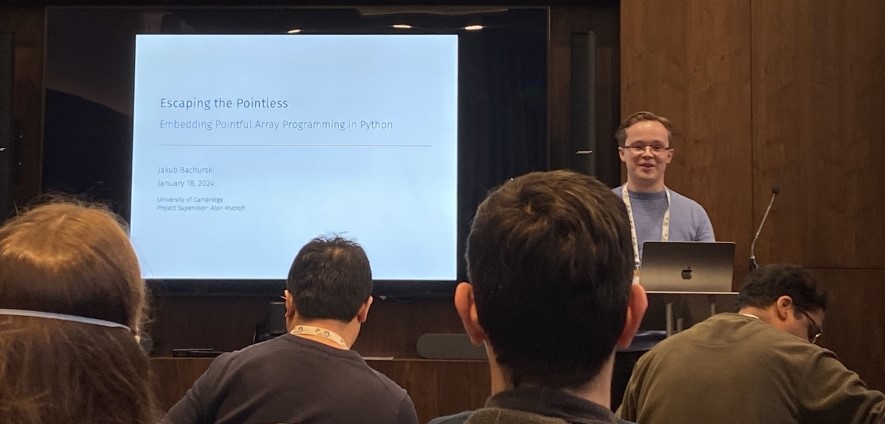
Submitted by Rachel Gardner on Wed, 05/06/2024 - 17:06
Many congratulations to 3rd-year undergraduate Jakub Bachurski! He has just been named the Undergraduate Grand Finals Winner in the Student Research Competition run by the Association for Computing Machinery.
The SRC Grand Finals are the culmination of a year-long competition that involved more than 323 computer science students presenting research projects at 21 major ACM conferences.
The Association for Computing Machinery is the international learned society for computing. Jakub took first place in the undergraduate category for his Bachelor's dissertation research (supervised by Emeritus Professor Alan Mycroft) into ways of solving problems in deep learning engineering by using the techniques of compilers and programming languages.
His project is entitled 'Escaping the Pointless: Embedding Pointful Array Programming in Python'.
Second Place in the Undergraduate category went to Amar Shah of the University of California, Berkeley, for his entry, 'An Eager SMT Solver for Algebraic Data Type Queries'. Third Place went to Rhett Olson of the University of Minnesota for his entry, 'An Automatic Approach to Finding Geographic Name Changes on Historical Maps'
The ACM Student Research Competition is an internationally recognised venue that offers students chances to win not only awards but also recognition, opportunities to meet and network with researchers in their field of interest and valuable presenting experience.
"A lot of deep learning research and scientific computing nowadays is happening using large-scale numerical computations in the form of array programming," Jakub explains, giving the background to his research.
"Very often this ends up using Python and one of many libraries descending from NumPy. A shared trait between all those libraries is a particular style of coding, called the array programming model. This paradigm, though widespread and somewhat practical, does not generalise well to more complex programs on multidimensional data, slowing down the programmer and hence research progress.
"My work enables the pointful style of array programming in Python, which seeks to remedy this. To make it viable, I formally show that there is a way to translate this style to the established model. This means that my proposed language can be executed using existing libraries and tools, and hence integrated with other popular approaches such as TensorFlow or PyTorch. In many cases my language is just as performant, if not faster, as code written in the old style, while being more readable and closer to mathematical notation.
"The research solves problems in deep learning engineering by using techniques of compilers and programming languages."
Many congratulations on your achievement, Jakub.

